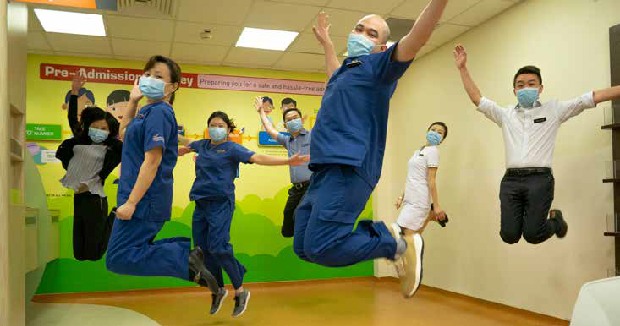Award-winning preoperative programme to prepare elderly patients for surgery brings improved outcomes and cost savings
For the frail and the old, preparing for major surgery is like getting ready to run a marathon. The fitter and better prepared they are, the faster and better their recovery will be.
To ensure that this group of patients gets the best shot at leaving the operating room with as short and uneventful a recovery as possible, a Singapore General Hospital (SGH) team has designed a programme to do just that. Called Perioperative Programme for Elderly (PREPARE), the programme aims to enhance the general health and well-being of frail elderly patients before they undergo major surgery.

<<The PREPARE team includes (from left) Admitting Services Executive Reanne Lim, Physiotherapist Joy Tan,
Physiotherapist Lee Xiaoting, Senior Principal Dietitian Tan Lee Boo, Senior Consultant Dr Hairil Rizal Abdullah,
Nurse Clinician Ng Kai Lee, and Internal Medicine Consultant Dr Aland Shum.>>
“Imagine running a marathon without training. The ability to complete the race is questionable, and recovery will be long and painful. This is why competitive marathoners work with a team of experts to ensure they are in top form when they race. The idea of PREPARE is similar,” said Dr Hairil Rizal Abdullah, Senior Consultant, Department of Anaesthesiology, SGH, who led the team that introduced PREPARE at the hospital’s Pre-Admission Centre (PAC) in January 2019.
The PREPARE team comprises anaesthesiologists, physiotherapists, internal medicine specialists, nurses, and dietitians. They work within the PAC so that they can offer relevant treatment to patients who need their fitness bolstered quickly before surgery.
When patients aged 65 years and above visit the PAC for their pre-surgery assessment, they undergo screening by a nurse. An anaesthesiologist then draws up a personalised plan based on the results of the screening. For instance, the patient may need to see a physiotherapist, who will further assess and teach him exercises to do at home preand post-surgery.
Patients may also be referred to a dietitian to raise their nutrition levels, and an internal medicine specialist to stabilise their pre-existing chronic medical problems, if necessary.
A comparison was made on the care outcomes of the 40 patients who went through PREPARE in 2019, against 90 patients from January to June 2018 who did not. These patients were aged 65 years and above, and had major abdominal surgery. The PREPARE cohort were discharged two to three days earlier, and paid 10 to 20 per cent less in hospital bills.
In addition, about 25 per cent more patients in the PREPARE cohort had no complications during hospitalisation, according to Dr Hairil.
The PREPARE initiative clinched 2020’s Care Redesign Best Practice Medal at the National Healthcare Innovation and Productivity Awards.
